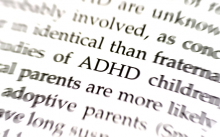Mike Barrett
Activist Post
A recent study has found that of every child in the same school grade level, the younger children are more likely to be diagnosed with attention-deficit hyperactive disorder (ADHD) than children months older.
Although these children are noticed and targeted first — undoubtedly for their less mature behavior, the increase in prescriptions for ADHD medications over the years shows that the psychiatric and pharmaceutical industry are continually lessening the conditions upon which a child can be diagnosed with ADHD.
In British Columbia, the cutoff date for entering school in any year is December 31st, making children born in January the oldest in their grade, and children born in December the youngest. Researchers looked at approximately 1 million children ages 6-12 diagnosed with ADHD and found that those born in December were 39 percent more likely to be labeled as having ADHD, and 48 percent more likely to be treated with ADHD medication, than those born in January.
‘Our study suggests younger, less mature children are inappropriately being labeled and treated…it is important not to expose children to potential harms from unnecessary diagnosis and use of medications,’ study researcher Richard Morrow, of the University of British Columbia, said.
As rates of ADHD escalate each year, more and more children are stricken by not the ‘disorder’, but the medication that is prescribed to fix it.
ADHD has become one of the most commonly diagnosed childhood disorders today, with an average of 9 percent of children between the ages of 5 and 17 being diagnosed with the disease each year. Over 18 million prescriptions were written for Adderall in 2010, up 13.4 percent from 2009. The massive increase has actually led to ADHD medication shortages, where pharmaceutical companies are actually struggling to acquire enough of the active ingredient used in the drugs to ‘treat’ the ADHD label.
Children are prescribed these behavior altering drugs, which alter their brain chemistry and lead to more serious problems like depression and drug dependencies later in life. Pharmaceuticals are only a temporary fix that do not address the fundamental issues behind ADHD, or any disorder for that matter. The lack of necessity regarding these pharmaceuticals has even sparked outcry against antipsychotics by mainstream health officials.
Aside from an epidemic of misdiagnoses, an improper diet has everything to do with children expressing what would be viewed as ADHD-like behavior. For parents with children labeled with ADHD, try the simple test of helping to alter your child’s diet.
Explore More:
- Simple Dietary Changes is the Answer to Treating Children Labeled as Having ADHD
- Pharmaceutical Companies Struggle With ADHD Drug Shortages
- More Autism Diagnoses in High-Tech Areas, Study Finds
- Survey | Unvaccinated Children Healthier and have Extremely Low Autism Rates
- DSM – The ‘Psychiatric Bible’ Responsible for Over Medicating the Population
- Behind ADD | Drugs, Solutions, and Pharmaceutical Lies
This article first appeared at Natural Society, an excellent resource for health news and vaccine information.



Be the first to comment on "ADHD Diagnoses More Common in Younger Children"